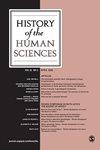击败同性恋的“社会危险”,同时“打造祖国”:墨西哥国家发展中的性科学和生物类型学,1927 - 1957
IF 0.5
2区 历史学
Q2 HISTORY & PHILOSOPHY OF SCIENCE
引用次数: 0
摘要
这篇文章将墨西哥的性学,以及它是如何在墨西哥革命(1910-20)之后的国家建设项目中涉及同性恋和性别不一致性的。它认为,就像对种族的理解一样,受新拉马克主义和“拉丁”优生学影响的墨西哥性学家认为,性在很大程度上是由社会和环境因素造成的,而不是简单地作为一种先天特征。这些专家主张为同性恋所代表的“危险状态”寻求社会解决方案,他们的干预目标是年轻人,他们被视为柔韧的未来公民,而不是成年人,他们在很大程度上被视为无可救药,最好与国家机构隔离。本文探讨了从19世纪到20世纪中期墨西哥性学的话语、意识形态和方法论线索,该领域的专业化和跨国联系,青少年的案例研究,其中首选的解决方案包括促进家庭的稳定和凝聚力,以及从监狱研究到墨西哥第一个广为人知的变性手术的接受者玛尔塔·奥尔莫斯的成人案例。总的来说,它展示了性学和与犯罪学、人类学和优生学相关的国家建设项目之间的重要交集,以及对同性恋和性别不一致的尝试管理如何更广泛地揭示了墨西哥的发展。本文章由计算机程序翻译,如有差异,请以英文原文为准。
Defeating the ‘social danger’ of homosexuality while ‘forging the fatherland’: Sexual science and biotypology in Mexico’s national development, 1927–57
This article situates Mexican sexology, and how it engaged homosexuality and gender nonconformity, within more familiar nation-building projects in Mexico following the Revolution (1910–20). It argues that much like with understandings of race, Mexican sexologists, influenced by neo-Lamarckism and ‘Latin' eugenics, viewed sexuality as caused largely by social and environmental factors, rather than simply as a congenital characteristic. Such experts advocated for social solutions for what they saw as the ‘state of danger’ that homosexuality represented, targeting their interventions at youths, who were seen as pliable, future citizens, rather than adults, who were largely seen as irredeemable and best isolated from the national body. The article explores discursive, ideological, and methodological threads in Mexican sexology from the 19th to the mid-20th century, the field’s professionalization and transnational connections, case studies of youths in which the preferred solutions involved promoting family stability and coherence, and adult cases ranging from prison studies to the case of Marta Olmos, recipient of Mexico’s first widely known sex reassignment. Overall, it demonstrates important intersections between sexology and nation-building projects related to criminology, anthropology, and eugenics, and how the attempted management of homosexuality and gender nonconformity sheds light on Mexican development more broadly.
求助全文
通过发布文献求助,成功后即可免费获取论文全文。
去求助
来源期刊

History of the Human Sciences
综合性期刊-科学史与科学哲学
CiteScore
1.60
自引率
11.10%
发文量
31
审稿时长
>12 weeks
期刊介绍:
History of the Human Sciences aims to expand our understanding of the human world through a broad interdisciplinary approach. The journal will bring you critical articles from sociology, psychology, anthropology and politics, and link their interests with those of philosophy, literary criticism, art history, linguistics, psychoanalysis, aesthetics and law.
 求助内容:
求助内容: 应助结果提醒方式:
应助结果提醒方式:


